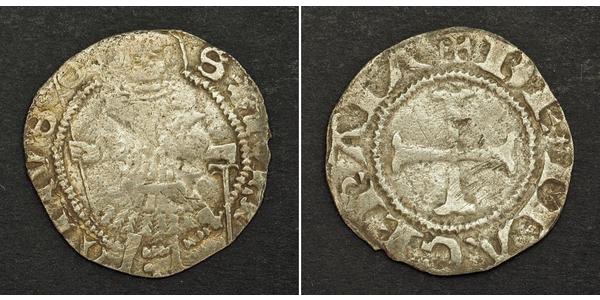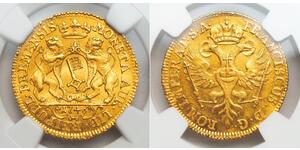(sold for $27.0)
1392, Italian States, Macerata (Autonomous City / Commune). Silver Grosso Coin.
Condition: F-VF Mint Place: Macerata Denomination: Grosso Mint Period: 1392-1447 AD Reference: Biaggi 1094, CNI 10. State: Macerata (Autonomous Commune in Italy) Diameter: 19mm Weight: 0.86gm Material: Silver
Obverse: Saint standing facing Legend: S*IV¡LI :. ANVS ° Reverse: Large cross within inner circle. Legend: + DE*MACERATA
Julian the Hospitaller is a Roman Catholic saint. The earliest known reference to Julian dates to the late twelfth century. He was known as the patron of the cities of Ghent and Macerata. The Paternoster (Our Father prayer) of St. Julian can be found as early as 1353 in Boccaccio's Decameron, and is still passed on by word of mouth throughout some places in Italy. The account is included the 13th-century Leggenda Aurea of Genoan Giacomo da Varazze, a Dominicanpriest. Beautiful stained glass depicting St. Julian by an unknown artist in the Cathedral of Chartres also dates back to the 13th century. Early fresco paintings of him are found in the Cathedral of Trento (14th century) and the Palazzo Comunale di Assisi.
According to Giacomo, on the night Julian was born, his father, a man of noble blood, saw pagan witches secretly lay a curse on the boy that would make him kill both his parents. His father wanted to get rid of the child, but his mother did not let him do so. As the boy grew into a handsome young man, his mother would often burst into tears because of the sin her son was destined to commit. When he finally found out the reason for her tears, he swore he "would never commit such a sin" and "with great belief in Christ went off full of courage" as far away from his parents as he could. Some versions say that it was his mother who told him at the age of 10, while others say it was a stag he met in the forest while hunting (a situation used in depicting St. Julian in statues and pictures). After fifty days of walking he finally reached Galicia where he married a "good woman", said to be a wealthy widow.
Twenty years later, his parents decided to go look for their now thirty-year-old son. When they arrived, they visited the altar of St. James, and "as soon as they came out of the church they met a woman sitting on a chair outside, whom the pilgrims greeted and asked, for Jesus' love, whether she would host them for the night as they were tired." She let them in and told them that her husband, Julian, was out hunting. (This is why he is also known as the patron of hunters.) The mother and father were overjoyed to have found their son, as was Julian's wife. "She took care of them well and had them rest in her and Julian's bed." But the enemy went off seeking Julian and told him: 'I have sour news for you. While you are here, hunting, your wife is in bed embracing another man. There they are right now, still sleeping.'"
De Verazze continues: "And Julian felt deep sadness and his face drew into a frown. He rode back home, went to his bed and found a man and a woman sleeping in it. He drew his sword and killed them both. He was about to take off and never again set foot in that land, but as he was leaving he saw his wife sitting among the other women. She told him: 'There are your mother and father resting in your room.' And so Julian knew, and fell into a rage. 'The shrewd enemy lied to me when he said my wife was betraying me', and while kissing their wounds he cried 'Better had I never been born, for I am cursed in soul and body.' And his good wife comforted him and said 'Have faith in Christ Almighty, a stream of life and mercy.' They had no children... Gold and silver they had a lot... And after seeking redemption in Rome, Julian built seven hospitals and twenty-five houses. And the poor started flowing to him, to Jesus' Almighty's love."
De Verazze continues: "The enemy conspired again to ruin Julian—disguised as a weak pilgrim, he was let in by Julian with the others. At midnight he woke up and made a mess of the house." The following morning Julian saw the damage and swore never to let in anyone else in his home. He was so furious he had everyone leave. "And Jesus went to him, again as a pilgrim, seeking rest. He asked humbly, in the name of God, for shelter. But Julian answered with contempt: 'I shall not let you in. Go away, for the other night I had my home so vandalized that I shall never let you in.' And Christ told him 'Hold my walking-stick, please.' Julian, embarrassed, went to take the stick, and it stuck to his hands. And Julian recognized him at once and said 'He tricked me, the enemy who does not want me to be your faithful servant. But I shall embrace you, I do not care about him; and for your love I shall give shelter to whoever needs.' He knelt and Jesus forgave him, and Julian asked, full of repentance, forgiveness for his wife and parents. Some versions skip the second mistake and tell of an angel visiting Julian and announcing to him that he is forgiven.
Buy with confidence!
Macerata is a city and comune in central Italy, the county seat of the province of Macerata in the Marche region.
Only 1$ shipping for each additional item purchased!

|
Posted by:
anonymous 2019-07-17 |
1 Ducat States of Germany Gold
group has 7 coins / 5 prices
⇑
1 Riksdaler Sweden Silver
group has 4 coins / 3 prices
⇑















